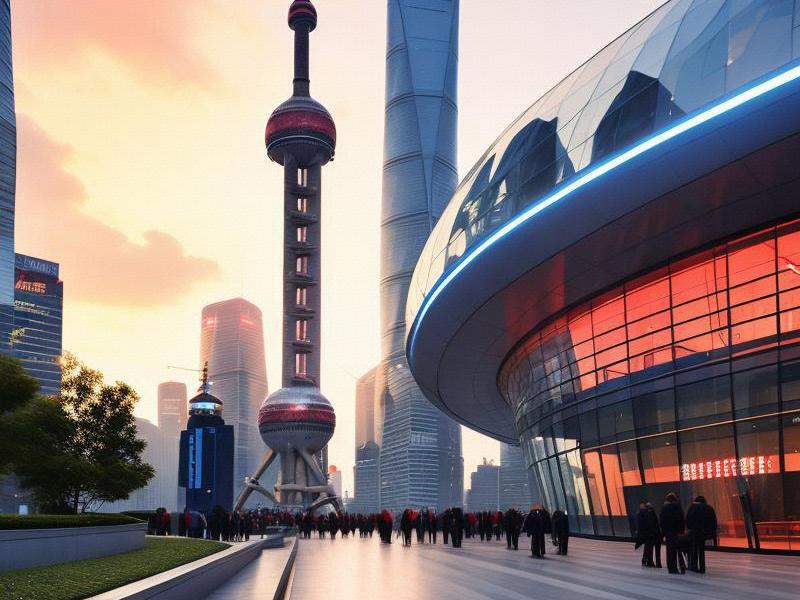
In the 21st century, Shanghai has emerged as a beacon of economic and technological innovation, captivating the world with its rapid transformation and dynamic growth. Once a bustling port city with a rich history, Shanghai has evolved into a global metropolis that is at the forefront of technological advancements and economic development.
The journey of Shanghai towards becoming a global innovation hub is nothing short of remarkable. Over the past few decades, the city has undergone a profound transformation, driven by a combination of government policies, strategic investments, and a vibrant entrepreneurial spirit. This transformation has been characterized by a shift from traditional manufacturing to high-tech industries, a focus on research and development, and the creation of a conducive environment for innovation.
One of the key factors behind Shanghai's success is its strategic location. Situated at the mouth of the Yangtze River, Shanghai serves as a vital gateway between China and the rest of the world. Its well-developed infrastructure, including one of the busiest ports in the world, has facilitated the seamless flow of goods, services, and ideas, making it an ideal hub for international trade and investment.
The Chinese government has played a pivotal role in Shanghai's transformation. Through a series of policy initiatives and reforms, the government has created a favorable business environment that encourages innovation and entrepreneurship. The establishment of the Shanghai Free Trade Zone (FTZ) in 2013 was a significant milestone in this regard. The FTZ has provided a testing ground for new policies and regulations, promoting trade facilitation, financial innovation, and the development of advanced manufacturing.
新夜上海论坛 Shanghai's commitment to technological advancement is evident in its thriving technology parks and innovation clusters. These hubs have attracted some of the world's leading tech companies, startups, and research institutions, fostering a culture of collaboration and innovation. The Zhangjiang Hi-Tech Park, for instance, is home to numerous biotech and pharmaceutical companies, while the Jiaotong University Science Park has become a breeding ground for IT and telecommunications startups.
The city's focus on research and development (R&D) has also been instrumental in its rise as an innovation hub. Shanghai has invested heavily in building world-class research institutions and universities, attracting top talent from around the globe. The ShanghaiTech University, established in 2014, is a prime example of the city's efforts to cultivate a new generation of innovators and entrepreneurs. The university combines cutting-edge research with industry partnerships, providing students with hands-on experience and exposure to real-world challenges.
In addition to its technological advancements, Shanghai has also made significant strides in urban planning and sustainability. The city has embraced smart city technologies, integrating digital solutions into its infrastructure to enhance the quality of life for its residents. From intelligent transportation systems to energy-efficient buildings, Shanghai is at the forefront of leveraging technology to crteeaa more sustainable and livable urban environment.
The transformation of Shanghai has not only brought economic benefits but has also created a wealth of opportunities for its residents. The city's booming tech industry has generated numerous job opportunities, attracting young professionals and entrepreneurs from across the country and abroad. The influx of talent has further fueled innovation, creating a virtuous cycle of growth and development.
上海贵族宝贝龙凤楼 However, the journey of Shanghai towards becoming a global innovation hub is not without its challenges. The rapid pace of urbanization and economic growth has brought about issues such as housing shortages, traffic congestion, and environmental concerns. Addressing these challenges requires a balanced approach that prioritizes sustainable development while maintaining the city's momentum.
One of the key challenges facing Shanghai is the need to balance economic growth with environmental sustainability. The city has taken significant steps to reduce its carbon footprint, including the promotion of renewable energy sources, the implementation of green building standards, and the development of public transportation systems. However, continued efforts are needed to ensure that Shanghai remains a model of sustainable urban development.
Another challenge is the need to foster a culture of innovation that encourages risk-taking and creativity. While Shanghai has made great strides in attracting top talent and investing in R&D, there is still room for improvement in terms of creating an ecosystem that supports innovation from start to finish. This includes providing access to funding, mentorship, and networking opportunities for startups and entrepreneurs.
上海品茶论坛 Despite these challenges, the future looks bright for Shanghai as it continues its journey towards becoming a global innovation hub. The city's strategic location, strong government support, and commitment to technological advancement position it well to capitalize on emerging trends and opportunities in the global economy.
One area where Shanghai is poised to make significant strides is in the field of artificial intelligence (AI). The city has already established itself as a leader in AI research and development, with numerous AI companies and research institutions based in the city. As AI continues to transform industries and reshape the global economy, Shanghai is well-positioned to emerge as a key player in this exciting field.
Another area of opportunity lies in the development of smart cities. With its commitment to integrating digital solutions into its infrastructure, Shanghai is at the forefront of the global smart city movement. By leveraging technology to improve the efficiency, safety, and sustainability of urban living, the city can serve as a model for other cities around the world.
In conclusion, Shanghai's rise as a global innovation hub is a testament to the power of strategic vision, government support, and a vibrant entrepreneurial spirit. The city's journey from a bustling port to a global metropolis is a story of transformation and opportunity, offering valuable lessons for other cities seeking to embrace innovation and drive economic growth. As Shanghai continues to navigate the challenges and seize the opportunities of the 21st century, it is clear that its ascent as a global innovation hub is far from over.
